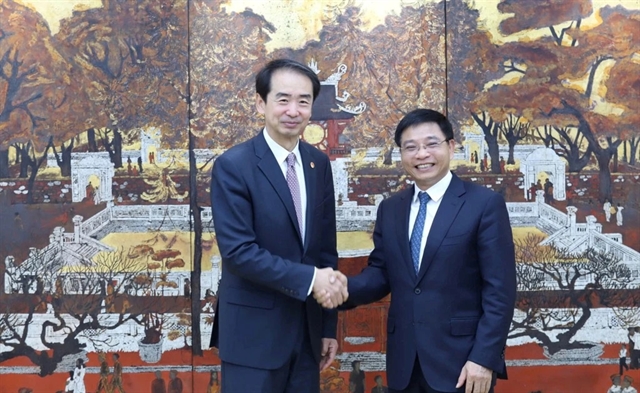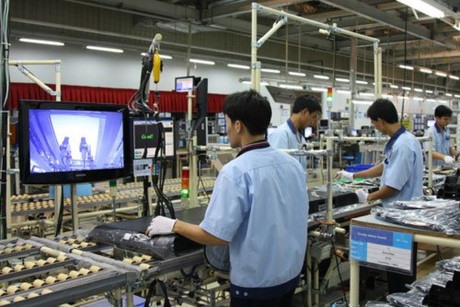 Economy
Economy

The Vietnamese economy is expected to be steady with inflation remaining under control. In addition, the Government will continue to implement measures to improve the business and investment environment and support businesses.
 |
| The Vietnamese economy is expected to be steady with inflation remaining under control. In addition, the Government will continue to implement measures to improve the business and investment environment and support businesses. — Photo giaothongvantai.vn |
Compiled by Thiên Lý
Trần Văn Mỹ, general director of Phong Điền Scavi Company, said that his company is building an industrial centre specialising in textile and garment at the Phong Điền Industrial Park Huế City.
The first hub of its kind in Việt Nam was in fact run on a trial basis in 2015 and 2016.
Mỹ said the facility is due to be put into operation in the second quarter of this year, bringing together various segments involved in textile production such as feedstock, fabric accessories, design, fashion illustration and finally production of large volumes of finished products for exports.
This closed production chain is expected to help not only strengthen the brand appeal and prestige of Vietnamese garment and textile products in the global market, increasing exports, but also address the current scale in the sector.
It is also expected to attract foreign investment since many foreign apparel manufacturers are keen to invest in the Vietnamese textile industry where there are specialised models.
Elsewhere, the CEO of Việt Nam VP9 Company, said his company has set itself a sales target of US$300 million from technological products, particularly internet-based television cameras.
Explaining the company’s ambitious target, he told Tài Chính & Chứng Khoán that Việt Nam is the first country in the world to successfully develop smart cameras that run Android and instal millions of Android applications, ushering in a new era of the internet of things.
Those smart products are now in demand around the world, and so are expected to be shipped to major markets such as the US, Europe and Japan, he said.
Besides focusing on exports, many companies including State and private ones have also drawn up ambitious strategies to expand their shares in the domestic market this year by enlarging distribution networks and consolidating their brand strengths.
They include Việt Tiến Garment Company, Sài Gòn Co.op, Thegioididong, FPT, Vingroup and Vinamilk. They plan to increase their investments by 50 per cent to expand their distribution systems.
It is not only such big companies but also many small ones, including start-ups, who plan to step up investment in production and business and their distribution networks this year.
Analysts said many companies hope to increase exports this year thanks to possible advantages created by positive changes expected in both the domestic and global economies, including free trade agreements, many of which effect this year.
The International Monetary Fund (IMF) has predicted the global economy to grow by 3.5 per cent this year, while the World Bank believes 3.1 per cent growth is likely.
The Vietnamese economy is expected to be steady with inflation remaining under control. In addition, the Government will continue to implement measures to improve the business and investment environment and support businesses.
According to the Ministry of Trade and Industry, in 2017 Việt Nam’s economic integration will be further momentum.
It will have to implement all commitments under the ASEAN Free Trade Agreement with China and with other ASEAN member countries, the ASEAN Economic Community (AEC), World Trade Organisation (WTO), and new generation free trade agreements.
This is expected to create highly favourable conditions for the country’s economic development.
But analysts also warn about the many challenges in both the domestic and overseas markets that Vietnamese enterprises might face and have to overcome if they want to seize the opportunities, particularly for exports.
They said the growth quality as well as competitiveness of the Vietnamese economy remains low. Besides there is macroeconomic instability and infrastructure lack of adequate to meet the development needs.
Recent global developments such as US President Donald Trump’s protectionist rhetoric and Britain’s vote to quit the EU show that some major economies are tending to protectionism and reduced trade liberalisation.
This will change the structure of global commodity supply and demand, significantly affecting the global market and of course exports by Vietnamese businesses.
The analysts said Vietnamese businesses should focus on exploiting their domestic market, adding it would be an important factor in survival and development.
After Lunar New Year-Tết, liquidity at most banks is rather plentiful as people have again started putting their savings into them.
Yet many of them have quietly raised their deposit interest rates by 0.1-0.3 percentage points.
For instance, Eximbank raised the rate on three-month term deposits by 0.2 percentage points to 5.5 per cent.
Small banks have had to increase interest rates on long-term deposits to 8 per cent. They also had to give “lucky money” to those who made short-term deposits.
The chief of a bank with a chartered capital of VNĐ5 trillion said though liquidity is good bank had to increase deposit interest rates in order not to lose market share to smaller banks.
One of the reasons lenders are vying with each other to hike their deposit interest rates is that they have to have enough money since there is a possibility of strong credit growth of 18 per cent to even 30 per cent this year.
But this rate hike in the new year has gone against the State Bank of Việt Nam’s desire to lower interest rates to support the economy.
Some banking insiders also mentioned some other factors that are expected to impact the rates this year.
The first is the imminent strengthening of the dollar after the US Federal Reserve increases interest rates an expected three times this year as economic growth and inflation pick up.
They pointed out that đồng interest rates always have a close correlation with the value of the greenback.
The second reason is that Circular No.06, which caps the ratio of short-term funds that can be used for medium- and long-term loans, will reduce it from 60 per cent to 50 per cent this year.
This has forced banks to restructure their finances and increase interest rates on medium- and long-term deposits.
The hike in wages this year is likely to bring inflationary pressure on the economy.
However, some analysts said there remains a possibility of deposit interest rates falling this year in spite of many factors that seem like preventing such a likelihood.
But this requires the central bank to effectively control credit growth, and mechanisms and policies for bad debt settlement to prove their efficacy.
Nguyễn Thị Hồng, deputy governor of the SBV, said a series of new policies for settling bad debts would be announced this year. This might enable banks to steady and reduce first the deposit interest rates and then the lending interest rates.
The SBV governor has also expressed determination to address the bad debts problem this year. The central bank will carry out many debt buying and selling market measures and set up a transparent debt trading market that will attract domestic and foreign investors.
The central bank instructed credit institutions to seriously implement regulations and guidelines related on interest rates under its Directive No.01/CT-NHNN issued this year.
Vietcombank chairman Nghiêm Xuân Thành said if bad debts are recovered by the Việt Nam Asset Management Company (VAMC) it would help banks have “more room” to lower interest rates.
Lowering the interest rates will become even more feasible if banks can recover their bad debts by themselves.
This year Vietcombank plans to buy all VNĐ4.3 trillion of NPLs that it sold to the VAMC, three years earlier than planned.
It will then settle the bad debts using its provisioning, hoping that as and when the debts are actually recovered the bank’s financial capacity will improve.
A Vietinbank official said this year the lender would focus on settling bad debts, and buy back all the bad debts it had sold to the VAMC.
Amid the fierce competition between banks, Vietinbank plans to completely settle the bad debts year instead of in 2018 as it had planned earlier. — VNS